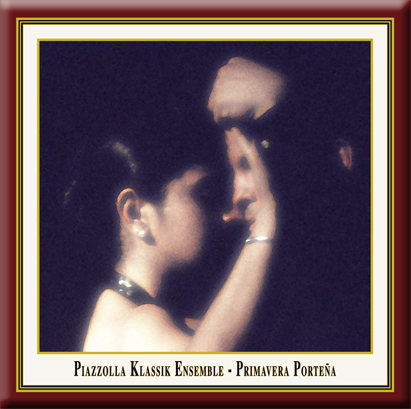 |
 |
 |
 |


|
Piazzolla Classic Ensemble Astor Piazzolla (1921-1992): Johann Sebastian Bach (1685-1750): Recorded by GPM-Records and Studio Solingen, CD Audio, DDD, KuK 27 |
|
Publishing culture in its authentic form entails for us capturing and recording for posterity outstanding performances and concerts. The performers, audience, opus and room enter into an intimate dialogue that in its form and expression, its atmosphere, is unique and unrepeatable. It is our aim, the philosophy of our house, to enable the listener to acutely experience every facet of this symbiosis, the intensity of the performance. The results are unparalleled interpretations of musical and literary works, simply - audiophile snapshots of permanent value, recorded in direct 2-Track Stereo digital. In our Edition Authentic Classical Concerts we go in search of this dialogue - to the large constructions and rare pearls of human architecture. For every building has its peculiarities, formed by its historical, acoustic and atmospheric circumstances. But the critical element remains the person, the artist with his intellectual sensibilities. The genesis, the origin, the environment, the musical evolution and education are all factors that develop our tastes and preferences: for example, for a love of large spaces, of classical or modern architecture. It is not without reason that the peoples of other continents and cultures enthuse over the fascination of the European experience... is not the land of endless possibilities or the magic of the orient equally worthy of a visit? Is not the sensitivity of an Italian opera singer or a Russian violinist crucial to the interpretation, the handling of the composition, the work? Thus it is, for example, that the Tango Argentino becomes a synonym for the melancholy of the European emigrant in Buenos Aires - expressing the feelings of those uprooted from the old world who had not yet found a place in the new. The musicians of the Piazzolla Classic Ensemble, being of Russian origin while playing as soloists and members of international orchestras, find themselves in a similar emotional situation. The performers empathy with the melancholy, dolor and ardor is evident - surprisingly allowing us to visualize how much Piazzolla's compositions reflect the feelings and the passions of the Russian soul. Impressive, also, is the emotional catharsis of the tango's pain and sadness in the successful bridge formed to the works of Johann Sebastian Bach, his sublime harmonies allowing a ray of sunshine to appear on the overcast horizon of expatriation. Josef Stefan Kindler |
|
Thus it is, for example, that the Tango Argentino becomes a synonym for the melancholy of the European emigrant in Buenos Aires - expressing the feelings of those uprooted from the old world who had not yet found a place in the new. The musicians of the Piazzolla Classic Ensemble, being of Russian origin while playing as soloists and members of international orchestras, find themselves in a similar emotional situation. The performers empathy with the melancholy, dolor and ardor is evident - surprisingly allowing us to visualize how much Piazzolla's compositions reflect the feelings and the passions of the Russian soul. Impressive, also, is the emotional catharsis of the tango's pain and sadness in the successful bridge formed to the works of Johann Sebastian Bach, his sublime harmonies allowing a ray of sunshine to appear on the overcast horizon of expatriation. Josef Stefan Kindler |
|
The Piazzolla Classic Ensemble was founded by soloists of the "Internationalen Symphoniker Deutschland" in 2003. These graduates of renowned conservatories in Russia and Germany are prize winners of many international competitions and are much sought after artists at home and abroad.
|
|
Piazzolla Classic Ensemble
1. Oblivion Las cuatro estaciónes porteñas 2. Primavera Porteña (Spring)
6. Allegro |